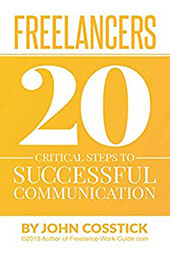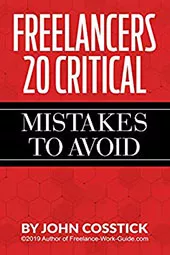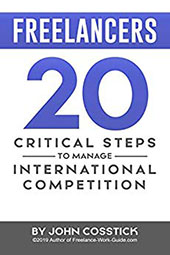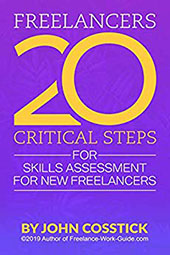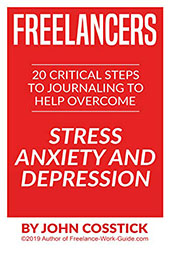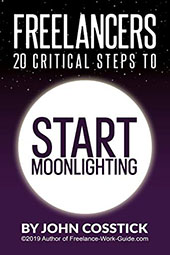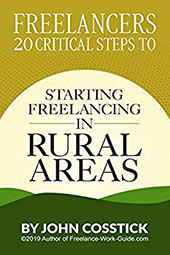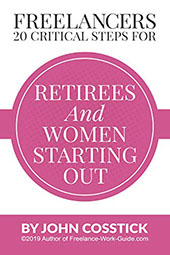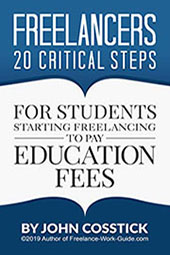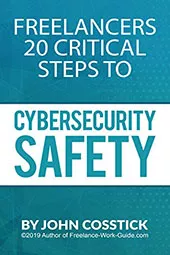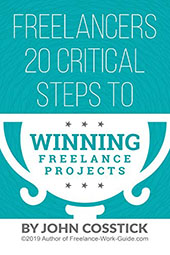Our eBooks aim to arm you with everything you must know for freelancing success and help you deal with the pressures. And we are adding new articles all the time to our website. If you want to contribute to our website become a guest writer. Click on the icon on the right to read our policy.
Freelancing is the new way of working taking the world by storm. It is taking over much of the traditional ways of working.
You may be considering freelancing as a second job or trying it out to eventually replace your full-time job. While this is all well and good when you think about it, there is a lot to know about freelancing for success.
That is why we have put together The Ultimate Freelancing Library to give you the information you need to succeed in the freelance world. Periodically we have Free or Reduced Price price offers for the eBooks. The next one is scheduled for 12th March to 16th March 2021 inclusive.
Get your copies now for just $5 each. Each and every ebook adds to your freelancing knowledge to set you up for success. Here is a summary of the content of each one. To look inside each book click on the icon beside each summary.
Which ones will you choose?
20 Critical Steps to Cybersecurity
Cybersecurity is something on all our minds today. If not, then it should be with a massive 424% increase in cyberattacks. As a freelancer you will spend a lot of time on the internet so protecting yourself is more important than ever.
Answer the following questions:
- Does internet security worry you?
- Do you pay for good antivirus software or do you rely on free software?
- Has your system ever been breached?
- What would you do if you were hacked?
- Do you have a data back-up plan in place?
Our ebook 20 Critical Steps to Cybersecurity gives you a comprehensive strategy to keep you safe on the internet. Here is a snapshot of the information in the ebook:
- Building strong passwords for all accounts. Building strong passwords is the first line of defence against cybercriminals. How difficult is your password to crack for a hacker?
- Choosing clients wisely. You need to trust clients to send clean files and are not posing as a scammer or hacker wanting to send infected files. How do you choose clients wisely?
- Avoid using public Wi-Fi networks. Studies show that 1 in 4 public Wi-Fi hotspots are particularly vulnerable to hacking. From where do you connect to the internet?
- Use a VPN. A virtual private network (VPN) allows you to browse the internet anonymously while encrypting the data you send and hides your details. How do you protect yourself online?
- Use antivirus software. Are you still using free antivirus software? Use a good antivirus software that checks the status of the files before allowing the download.
- Only download products from trusted sources. Fraudsters set up fake websites that emulate authentic sites. Do you make sure you only download from trusted sources?
- Research any online tool you intend to use. Be careful what you download to your system. There are many viruses hidden as downloads.
- Use social media with care. The harsh reality is that social media is one of the most common facilitators of online fraud and cybercriminal activity. Are you vigilant in protecting yourself when using social media?
- Only send essential personal information. In today’s climate of fraudsters and scammers, find out how to send only the essential personal information.
- Only provide the necessary payment data. Getting paid is important as a freelancer and most likely money it will be electronically. Discover how to only give out the necessary data.
- Delete unneeded files. Hoarding files can become too easy but do so at the peril of your cybersecurity. Are you a file hoarder?
- Store archive data on external hard drives. With 40 account breaches every second of every day, store archive data on external hard drives. Do you already do this?
- Prohibit macros and potentially dangerous files. Macros are pieces of code added to documents that are primarily designed to automate repetitive tasks. Hackers often use these to access your system. Have you ever been hacked?
- Update software and operating systems. The latest operating systems are naturally better protected against hackers. Do you update your systems and software when prompted?
- Choose a winning web host. Choosing the right web host is one of the most important decisions. Look at their security options before making a choice.
- Use a dedicated email address. A dedicated email address gives your freelancing business a professional feel. Do you have a personalised email address rather than a generic one?
- Use two-factor verification. Two-factor verification takes securing your accounts to a new level. Do you know how to do this?
- Beware of who you talk to. People aren’t always as honest as they make out and cybersecurity attacks don’t always result in money being stolen. How open are you with the invisible people you meet in cyberspace?
- Keep your Tech Devices Safe. With all this talk of safety in the cyber world, don’t forget to protect your devices in the real world. What do you do to protect your devices when out and about?
- Don’t drop your guard. Remember, protecting your device keeps you safe. Don’t drop your guard. Avoid relying on free antivirus software.
Whether moonlighting or working full-time online as a freelancer, don’t neglect to protect yourself from cybercriminals. Download your copy of 20 Critical Steps to Cybersecurity now!
20 Critical Steps to Start Moonlighting as a Freelancer
Let’s face it. In today’s world, it gets harder and harder to stay ahead of he bills. Maybe you never have enough money to stay ahead of the debt collector or you may want extra money for a holiday. No matter why. We all need a little extra money. Right? By following the 20 Critical Steps to Start Moonlighting as a Freelancer in our ebook it will set you up for success.
It contains vital information to get you started so your path to financial stability will become smoother. Is this what you want?
Ask yourself:
- Are you tired of juggling financially to make ends meet?
- Is there never enough?
- Do you worry about keeping a roof over your head?
- Then moonlighting as a freelancer can be the answer.
Here is a snapshot of what you will learn from this ebook:
- Respect your full-time role. Still respect your full-time job when moonlighting. What would you do if you lost it and had to rely on freelancing?
- Establish clear goals. What are your goals for freelancing? Is it to get ahead with the mortgage and other financial payments? Or, maybe you are planning to freelance full-time sometime in the future?
- Find your niche. What skills do you have to offer that makes you stand out against your global competitors? Find your niche area where you can succeed and excel.
- Know your target market. Do you know who your target market is? Do your research.
- Learn how to sell yourself. Learn how to sell yourself to attract clients. Are you equipped with the tools you need?
- Establish a work life balance. There’s no point moonlighting if all you have time for is making money. There is more to life. Do you have strategies in place to establish a work life balance?
- Set a pricing structure. Have you set a pricing structure for your work? This is important if you want to be paid fairly.
- Set clear payment expectations. Do you hate the thought of asking for money? Set clear payment expectations from the start.
- Get networking. Are you comfortable networking with others? Networking is valuable to your business so start.
- Reach out to clients. How are you going to reach out to clients you want to work with? Is this something you have considered?
- Find your passion. Find your passion. Do you know what it is? Doing what you are passionate about does not seem like work.
- Embrace communication technologies. Digital communication devices are at the heart of any freelancing business. Are you well-prepared?
- Invest in yourself. Invest in yourself? Do you know what this means? Read about it in our ebook.
- Plan treats. Plan to treat yourself. Did you know that planning treats can help keep you focused when you follow through?
- Don’t be afraid to learn on the job. It’s okay to make mistakes but it is how you deal with them that matters. Are you ready to take a leap of faith?
- Work smarter, not harder. Because you are moonlighting, you want to work smarter, not harder. Do you know how?
- Organise financial aspects. Have you thought about how to organise the financial aspects of moonlighting as a freelancer? You still have to pay tax.
- Protect yourself. How are you going to protect yourself against cybercriminals? What do you know about this?
- Seek feedback. Are you going to seek feedback from clients? It is important to encourage unbiased reviews of how you work and the results.
- Believe in yourself. Do you believe in yourself? You will never succeed without believing in your skills and abilities.
Moonlighting as a freelancer is a great means to earn extra money. 20 Critical Steps to Start Moonlighting as a Freelancer will help you get started. Download your copy now!
20 Critical Steps to Successful Communication
Communication is at the heart of success in so many business and everyday life events it is important that you get it right as a freelancer because you are in business for yourself.
It is vital that you communicate clearly about the critical aspects of any freelance project you may be bidding for because meetings are often virtual. It is important that you develop trust during these virtual meetings.
At the same time, you must have clarity so that the scope of your project is made clear and there are no misunderstandings between you and the employer.
That is why we have produced: FREELANCERS 20 Critical Steps to Successful Communication. Here is a snapshot of what you will receive:
- How to communicate professionally.
- Excelling at basic client communication.
- Establishing the scope of your project upfront.
- Why virtual meetings can still give project clarity.
- The importance of summarizing discussions in writing.
- Make sure the advice that you give is understood by clients.
- Know what the right questions are to ask.
- Why it is essential to answer client communications promptly.
- Putting change requests in writing.
- How to avoid frustration in communication with your clients.
- Why it is important not to bombard your clients with messages.
- Why you should say no to unpaid work.
- Knowing when to stay quiet is an important skill you need to know.
- When to turn down a project is something that is a need to know lesson.
- Why it is important never to miss a deadline.
- Sometimes it is necessary to sack difficult clients we explain why.
- How to recognize a difficult client upfront.
- Tips for trying to fix working relationships is critical.
- How and when to fire clients.
- Summing up all this vital information up in preparation for success.
Wherever in the world you are as a freelancer you must know how to handle clients in other countries, different time zones and different cultures. Now is the time to get your communication strategy right. Download your copy of Freelancers’ 20 Critical Steps to Successful Communication now by clicking on the icon.
20 Critical Steps to Freelancing For Women and Retirees
Freelancing is the solution to earning money for women and retirees. It is handy if you are topping up your income or want to freelance full-time. Freelancing is growing at a meteoric rate with no signs of slowing down.
Are you a stay at home mother who wants to add some cash to the family budget?
Are you a retiree who needs to top up your retirement income?
Do you want to supplement your full-time income?
Maybe you dream of becoming master of your own destiny.
We have written 20 critical steps to freelancing for women and retirees to help you get started and to set you up for success long term.
Here is a snapshot of hat you will learn:
- Complete a skills inventory. Learn how to complete a skills inventory to help you decide what skills to offer in the freelance market. What skills can you market as a freelancer?
- Set your prices. Setting the right pricing structure can make or break your freelancing business. Do you know how to set up a pricing structure?
- Join online freelancing platforms. Start researching freelance work platforms. Join a few to research which one will work best for you.
- Build a website. Don’t shy away from having a website to promote your work. Have you thought of investing in having your website professionally designed?
- Start marketing yourself. Once you have a website it is time to start marketing yourself online. Do you know how?
- Never stop learning. No matter your age, you never stop learning. What do you plan to learn next to boost your business?
- Managing your time. You need to manage your time now you are master of your own destiny. How are you going to do that?
- Plan for the future. Do you dream of escaping the traditional 9 to 5 grind? Start planning for the future.
- Have an emergency fund. What are you going to do if you don’t earn enough money? Set up an emergency fund for the tough times.
- Manage your finances. When you freelance, you may not be able to rely on a weekly wage. How are you going to manage your money?
- You still have to pay tax. Now you are in control of your own destiny, you are in control of paying your own tax. Learn how to make tax time painless.
- Learn to say no. As a freelancer you need to know how to say no or freelancing may not be profitable. How often do you say no?
- Create a portfolio. A simple one this one. Or is it? Create a portfolio that sells your skills to the world.
- Set up a home office. Do you have space at home for a small office or will you be working from internet cafes and libraries?
- Managing your freelance work. Now you are solely responsible for how much work coms in, gets done and its quality, you have to manage this as a freelancer. Do you have a system in place?
- Recognise red flags. Learn to recognise red flags when talking with potential clients. So, what are the red flags and how do you avoid them?
- Getting paid for your work. Obviously freelancing means you want to get paid. Do you have a system to keep the cash flowing in?
- Stay connected. Freelancing is mostly solitary. How are you going to stay connected with friends and meet new people?
- Look for a mentor. Have you thought about seeking out a mentor when you first start freelancing? Do you know how to find one?
- Take time off. And, don’t forget to take time off. It’s important to take a sanity break.
No matter whether you want to earn a little extra money or want a full-time career, freelancing is the way to success, reading 20 critical steps to freelancing for women and retirees sets you up for success. Download your copy now!
20 Critical Steps for Students Starting Freelancing to Pay Education Fees
While being a student are among the best years of your life, you are racking up debt before you even start working. Does this thought scare you? Even though it is inevitable you will need to work to put yourself through school. But, if you have the right skills, you can start freelancing to pay down your education fees.
Do you worry about money?
Do you worry about finding suitable work so you can still study?
Would you like the means to pay your education fees sooner rather than later?
If this sound like you then our ebook 20 Critical Steps for Students Starting Freelancing to Pay Education Fees will help you. Here is a snapshot of what you will learn:
- Investigate which skills will make you the most money. Before you start freelancing, do you know what skills will make you the most money? What do you have to offer that people will pay for?
- Invest in the best internet solution you can afford. How good is your internet? You need a good internet solution to freelance online. After all you have to meet deadlines.
- Join Amazon Prime Student. Do you know what Amazon Prime Student is? Check it out.
- Maximise your workspace for peak productivity. As a student, where are you going to do your freelancing work?
- Get a phone tariff with unlimited minutes. You cannot have limited phone time when freelancing. Do you want to lose internet or phone access at a crucial moment?
- Know where to find work online. Do you know here to find work online that suits your skills? Are you going to work through an online freelancing platform?
- But don’t neglect the market on your doorstep. Is there are a market for your skills among your fellow students? Don’t neglect what may be right on your doorstep.
- Invest in a virtual office. Have you considered investing in a virtual office? This can make your freelancing business appear more professional.
- Use a productivity app for efficient time management and easy collaboration. Your day will be super busy studying and building your freelance business. Have you thought of using a productivity app to keep you on track?
- If you have a car, keep it in tip-top shape. You may rely on your car if a freelancing job means you need to travel. Is your car reliable?
- Make sure you have a presence on all the right social platforms. Social media is important for marketing your freelance business. Do you know which ones are best for your set of skills?
- Invest in a decent quality website. Have you considered investing in a professional website? It represents you and your work so think about it.
- Don’t be afraid to talk to your tutors about your freelancing pursuits. Have you talked to your tutors about your freelancing work? Ask them for advice.
- Make the time to attend networking events, and know how to conduct yourself. Although you are super busy between school and work, do you make time to attend networking events? This is important for marketing yourself.
- Always, always, always back up your work. Do you always back up your work? Or don’t you worry about it? Find out why you should.
- Make time for extra-curricular learning. Make time in your busy schedule for extra-curricular learning to boost your earnings. It is worth the time you spend.
- Know when to say “no” to paid work. You need to learn to say no to paid work. Taking on more than you can cope with can ruin your reputation if you fail.
- Remember, your income from freelancing is taxable, even though you’re a student. Did you know you are responsible for your own tax as a freelancer?
- Know your worth. Just because you are a student doesn’t mean you are worth any less if you have the skills. When you undercut yourself, your clients lose respect.
- Make time for you! At the end of the day, you need to make time for you to rejuvenate and have some fun. You should not spend every waking moment working.
Freelancing is a great way for students to earn the money they need while easily fitting work round their studies and social life. 20 Critical Steps for Students Starting Freelancing to Pay Education Fees will show you how. Download your copy now!
20 Critical Steps to Starting Freelancing in Rural Areas
In an era where it is tougher than ever to get a job, living in a rural area jobs are in shorter supply than ever.
Are you struggling to make ends meet living in the country?
Do you dream of being financially independent of a boss?
Are you looking for work to fit around your busy schedule?
Is work scarce in your area?
Do you have to travel long hours to get to work?
There is a solution—freelancing!
Our ebook 20 Critical Steps to Starting Freelancing in Rural Areas is just what you need to set you up for success. Here is a snapshot of what you will learn:
- Decide on your most monetizable skills. What skills are you going to bring to the free market? You need to work out what your most monetizable skills are.
- Invest in the best internet connection you can get. Living in a rural area can mean unpredictable internet connections and speeds. Have you invested in the best internet connection you can get?
- Get on a phone tariff with a good call allowance. You do not want to run out of credit when on a vital call or have your calls cost you too much because you live in the country. Have you got the best phone deal you can get?
- Don’t quit your day job (just yet). As you start freelancing you may want to quit you day job. Avoid acting hastily. Don’t quit your job just yet. But when?
- Know the best online platforms to find new work. There are a lot of online freelancing platforms. Do you know which ones are the best to use?
- Establish a presence on the right social platforms. Social media is a great way to promote your freelancing business. Do you know which ones are the right ones for your business?
- Build a website that showcases your skills. Do you have a website to showcase your skills? You need one for visibility in cyberspace.
- Make sure your vehicle is in tip-top shape. Living in the country you will need a reliable vehicle. Is yours in tip top shape?
- Ensure that you have a space in your home that’s just for working. Where are you going to work from in your home? The kitchen table? In front of the tv? Or do you have spare space for a home office?
- Make networking events a part of your schedule. Does living in the country make you feel isolated? Make networking events a part of your schedule.
- Make sure you’re always growing your skills. Do you continue to work on your personal development as a freelancer? Work on skills that can help earn you more money.
- Incentivise referrals for your clients. Do you offer incentives to clients for referring your work? Should you? How does it work?
- Incentivise reviews to leverage social proof. Ask clients for reviews to prove you have the skills you advertise. Have you thought about client feedback?
- Don’t burn any bridges with your previous employer … They could be a goldmine of opportunity! Do you know that old saying about burning bridges? Not only does it shut off opportunities, it can damage your reputation.
- Invest in a virtual office. Have you thought of investing in a virtual office? This can make your business appear more professional.
- Keep an eye on the competition. Do you know who your competition is? What makes you better than them?
- Charge what you’re worth! Do not underestimate your worth. Undercutting others may not make you a profit.
- Manage your time and keep setting working hours. Now you are in control of your working life, how are you going to manage your time? What hours do you intend to work?
- Invest in a good accountant. Are you good with bookwork? If not, or do not have time, invest in a good accountant.
- Make time to rest. Don’t forget to make time to rest. It revitalises and rejuvenates your mind, body and soul to grow your freelance business. Do you have a habit of working too much?
20 Critical Steps to Starting Freelancing in Rural Areas shows you how to build a business from anywhere. Download your copy now!
20 Critical Steps for Freelancers to Manage International Competition
International competition is inevitable when freelancing on the open market. People from all walks of life, are now freelancing.
Does worrying about your competition hold you back?
Do you even know who your competition is and where it comes from?
Do you know how to check your competition out?
Are you concerned potential clients will not notice you because of the competition?
You need to consistently monitor the market to see what you are up against.
20 Critical Steps for Freelancers to Manage International Competition gives you insider tips to help you deal with competition. Here is a snapshot of what you will learn:
- Understand the freelance market. Do you understand the freelance market? If not, why not if that’s what you want to do?
- Know your competition. Do you know your competition? Why should potential clients give you work instead of them?
- How do you deal with competition? Good question. How are you going to deal with your competition?
- Research your competition. Have you researched your competition? What do you think about their businesses?
- What did your competitors teach you? Did you learn anything from your competitors? What did they teach you?
- Join a freelance work platform. Have you joined a freelance platform yet? Research them and join one or two to learn how they work.
- Making comparisons is damaging. Do you compare yourself to successful freelancers? Keep in mind they started somewhere and it probably took them years to build their reputations. Making comparisons is damaging.
- Craft a profile that gets results. How good is your profile? Does it get results? Consider hiring a freelance writer to craft a profile that gets results.
- Discover your point of difference. What is your point of difference? What makes you and your skills stand out in a crowded market?
- Identify your target market. Do you know who your target market is? You need to identify it to find where you fit in.
- Start bidding on projects. You have to start somewhere. Start bidding on projects. You will soon get into the swing of things with some practice.
- What demographics are you comfortable with? Some cultures are more difficult to work with than others? Do you know what demographics you are comfortable working with?
- Cultivate customer loyalty. Cultivate customer loyalty with top quality work and customer service. Will you go that extra mile to keep a client happy?
- Promote yourself. Promote yourself continually. How much do you promote your business now?
- Talking with potential clients is an art. You only get a few seconds to make an impression and engage with a potential client. Did you know talking with potential clients is an art?
- Set yourself up for success right from the start. Discuss everything upfront with a client to set yourself up for success right from the start. Do you get full project scope before starting the job?
- Show gratitude. Remember that online clients take a leap of faith when they agree to work with you. Do you show gratitude or are you argumentative with an entitled attitude?
- No is not a dirty word. No is not a dirty word in the freelancing business. Do you say no if you do not have the time or your skills may not quite fit the project?
- Avoid playing dirty tricks. Avoid playing dirty tricks in retaliation to anything nasty your competitors pull. How will you react in this situation?
- It’s a numbers game. Freelancing is a numbers game. The more projects you bid for the more likely you are to work consistently.
20 Critical Steps for Freelancers to Manage International Competition gives you insider information about how to deal with competitors from around the world. Download your copy now!
Top 20 Ways Journaling Can Help Overcome Stress, Anxiety and Depression
Mental illness is at an all time high across the world. From the rising cost of living to stagnating wages and a changing world, stress, anxiety and depression is prevalent.
Do you have to deal with stress, anxiety or depression?
How do you cope when you feel this way?
Do you know someone affected by mental illness?
Would you like a way to relieve your anxiety, depression or stress that is cheap and drug free?
Do you worry about your mental illness?
Top 20 ways Journaling can help Overcome Stress, Anxiety and Depression teaches you how to use journaling to make you feel better.
Here is a snapshot of how journaling helps you:
- Clarify your thinking.
- Vent your emotions .
- Practise gratitude.
- Get some peace and quiet.
- Improve your decision-making skills.
- Set yourself goals.
- Recognise your achievements.
- Boost your long-term memory.
- Establishing a routine.
- Find a creative outlet.
- Change your lifestyle.
- Uncover self-knowledge.
- Enhance your self-discipline.
- Boost your IQ.
- Enhance mindfulness.
- Advance your communication.
- Prepare for upcoming events.
- Prevent rumination.
- Measure your progress.
- Become more social.
Top 20 ways journaling can help overcome stress, anxiety and depression gives you the information for a simple, drug-free strategy to cope with anxiety, stress and depression. Download your copy now!
Freelancers’ 20 Critical Steps to Winning Freelance Projects
When you start out freelancing often you will be working through a freelance job site. This means you need to bid on projects to win them. And this is not easy if you do not know what to do. Too many people wonder why they cannot win a project when they do not have a clue how to write a submission that gets noticed and, when they do, fail to engage with the client to close the deal.
Top freelancers spend little time bidding on projects or writing proposals. Why? Mostly they have such good reputations that clients contact them directly. But when they do bid their proposals are short, to the point and offer prospective clients’ solutions. They have found their winning formula.
To help you win projects on freelancing websites, Freelancers’20 Critical steps to winning freelance projects dispels the myths. Here is a snapshot of what you will receive:
- Introduction to freelance job sites.
- Showcasing your skills in your profile.
- Keeping it simple.
- Treating your profile like it is a resume.
- Displaying your best work in a portfolio.
- Updating your profile and portfolio.
- Learning to write bids that convert.
- Addressing the client’s brief.
- Choosing projects wisely.
- Keeping your bids short and sweet.
- Sample submissions.
- Checking out the competition.
- Proofreading your submissions.
- Using a client’s budget as a guide.
- Getting into a client’s head.
- Finding a niche market.
- Setting up milestones.
- Outdoing yourself.
- Asking clients for feedback.
- Reviewing client reputations.
Wherever in the world you are freelancing you must know how to win freelancing projects in the global marketplace because it is the key to being able to earn a living. This guide that comes from years of experience will help establish what to do and what not to do. It shortcuts the time spent learning so that you can start earning. Download your copy of Freelancers’ 20 Critical Steps to Winning Freelance Projects now by clicking on the icon.
FREELANCERS’ 20 Critical Mistakes To Avoid
Learning from other freelancers’ mistakes is probably one of the most important strategies to adopt when you start out freelancing. This quote is from our Amazon eBook Freelancers’ 20 Critical Mistakes To Avoid.
“It is never too late to learn from your mistakes. And as a new freelancer there are a few to avoid if you want success and to build a professional freelancing business. Don’t think freelancing is easy. It’s not. Freelancing is a tough gig you must work hard at every day to build a client base and stand out from the crowd.
Are you making mistakes that hold you back from building a successful freelance business? We have compiled 20 critical mistakes to avoid as a freelancer to help fast track your success. These are the subjects covered:
- Plagiarising others’ work
- Not caring about your reputation
- Don’t think like an employee
- Missing deadlines is irresponsible
- Contribute more than the minimal requirements
- Not bothering to read a contract before signing
- Neglecting to use contracts
- Lying about your level of expertise
- Poor communication
- Ignoring clients’ communication
- Overloaded with work
- Charging too little
- Working for free
- Measure the results of converting bids into projects
- Failing to market yourself
- Not showcasing your work
- Taking any project just to work
- Don’t give up
- Saying yes to everyone
- Begging for work”
Knowing what mistakes to avoid when you start freelancing is critically important as it will save you time and money and help you get into profit quicker. Download your copy of Freelancers’ 20 Critical Mistakes To Avoid now.
Freelancers 20 Critical Steps for Skills Assessment for New Freelancers
If you have decided that you need to go freelancing to increase your income, but don’t know how then this Amazon eBook is for you. It will take you through the 20 critical steps to assess your skills that you currently have and those you should acquire. This is a quote from Freelancers’ 20 Critical Steps for Skills Assessment for New Freelancers:
“One reason many people cannot get started with freelancing, whether it is for a side gig or a full-time career, is that they are not sure what to do. It is not easy to know what skills to use or what skills are marketable.
This is important as you need the expertise to complete high-quality work and the skills you offer must be in demand if you are going to get any work. To work out which skills to use and what sort of work to target to kickstart your freelancing career, 20 Critical Steps for Skills Assessment for New Freelancers takes you through the top steps that you should take to get started.
- Start with your day job and work experience.
- Consider your hobbies and interests.
- Know how to turn your interests into marketable skills.
- Choose transferable skills.
- Take a skills assessment quiz.
- Understand the skills all freelancers need.
- Narrow your skills down to a niche market.
- Do not limit yourself to a single skill.
- Consider what skills complement each other.
- Consider the industries that you know.
- Assess others’ skills.
- Discover the most in-demand skills.
- Are your skills up to date?
- Understand the future demand for skills.
- Get back in touch with your qualifications.
- Think about how you want to work.
- How much time and energy you have?
- Skills all freelancers need.
- Learn new skills to fill in gaps or start afresh.
- Learn to market your skills.”
Whether starting moonlighting or planning to work full-time online as a freelancer, don’t neglect to make a skills assessment. Download your copy of Freelancers 20 Critical Steps for Skills Assessment for New Freelancers

